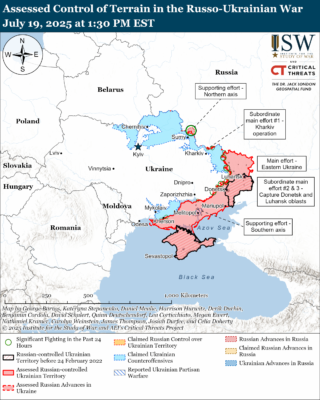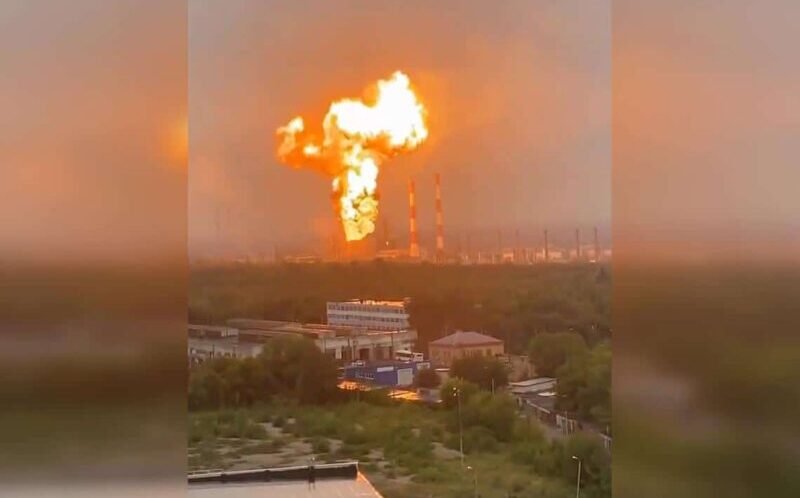Saturday’s Coverage: NATO Develops Mechanism for US Weapons to Kyiv

Map: Institute for the Study of War
Despite India’s refineries suspending deliveries of oil from Russia, “two senior Indian officials” have insisted there is no change in Government policy to restrict the imports.
Amid threats of secondary sanctions from Donald Trump and narrowing price discounts, Indian State-owned refineries suspended Russian oil purchases last month, according to sources speaking with Reuters.
But an official told the outlet, “These are long-term oil contracts. It is not so simple to just stop buying overnight.”
Despite the halt, Trump declared a 25% tariff starting on Friday, claiming that India and Russia are “dead economies”.
State-owned refiners such as Indian Oil, Hindustan Petroleum, and Bharat Petroleum have not purchased Russian oil for more than a week, said “four sources familiar with procurement plans”. The companies are sourcing mainly Middle Eastern grades such as Abu Dhabi’s Murban and West African crude.
At least four oil tankers, each with up 700,000 barrels, are idling off India’s western coast.
One official said the Government had “not given any direction to oil companies”.
On Friday, Foreign Ministry spokesman Randhir Jaiswal declared, in light of Trump’s threat, “Our bilateral relationships with various countries stand on their own merit and should not be seen from the prism of a third country. India and Russia have a steady and time-tested partnership.”
India sharply increased oil imports from Russia after Moscow’s 2022 full-scale invasion of Ukraine. It is second to China in purchases of Russian supplies.
Among the targets were:
The Ryazan oil refinery, Russia’s fourth largest;
The Novokuybyshevsk oil refinery in the Samara region, almost 1,100 km (684 miles) east of Moscow;
The Primorsko-Akhtarsk airfield in southwest Russia;
Two companies in the Penza region, about 750 km (466 miles) southeast of Moscow, specializing in control elements, telecommunications systems, cryptographic communications equipment, and printed circuit boards for Russian missile systems and the space program;
Russia’s sole defense facility producing air defense command centers.
A section of the Central Asia gas pipeline, the third-longest in the world at 5,000 km (3,107 miles), transporting natural gas from Turkmenistan through Uzbekistan and Kazakhstan to Russia.
Big night of Ukrainian precision strikes on Russian refineries, military industries and military airfields. Here is Novokuybyshevsk east of the Volga. pic.twitter.com/TF3hp1x9vT
— Yaroslav Trofimov (@yarotrof) August 2, 2025
The Ukrainian military said a large fire was set at the Ryazan refinery. The complex produces about 840,000 tons of TS-1 aviation kerosene per year, around 8.4% of Russia’s total, and up to 17 million tons of oil, 6.1% of annual refining.
Drones also attacked the Annanefteproduct oil depot, which handles up to 160,000 tons of light petroleum products per year, in the Voronezh region.
Russia’s Defence Ministry claimed 112 Ukrainian drones were downed over almost nine hours from Friday night to Saturday morning. Samara Governor Vyacheslav Fedorishchev declared that an elderly man was killed inside a house that caught fire from falling drone debris. A guard at an industrial facility was killed, said acting Rostov Governor Yuri Sliusar. In Penza, Governor Oleg Melnichenko said a woman was killed and two people wounded.
In his nightly address to the nation, Ukraine President Volodymyr Zelensky commented:
Today I received a report from the Head of the Security Service of Ukraine, Vasyl Maliuk. I am grateful for our special long-range operations on Russian territory. Each of them is tangible for the enemy, and our operations will continue – Russia is dragging out the war, so it… pic.twitter.com/Tfvkru58Ix
— Volodymyr Zelenskyy / Володимир Зеленський (@ZelenskyyUa) August 2, 2025
